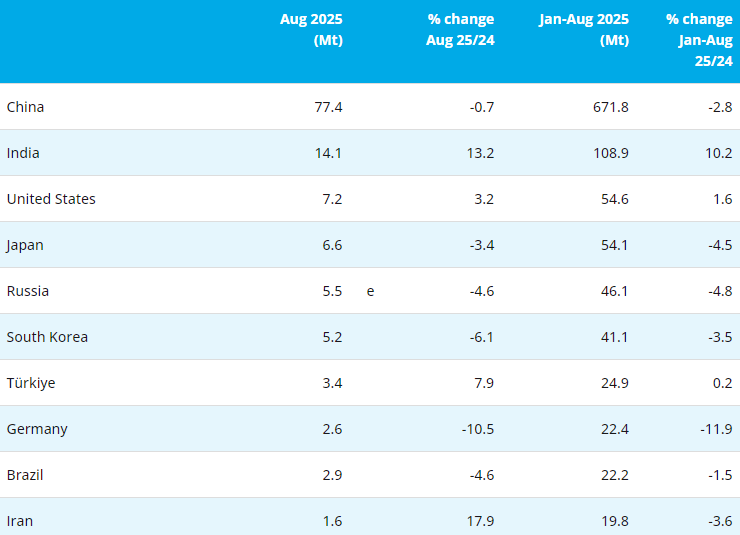Japan's spot indium import trade stayed dull as manufacturers of indium tin oxide continue to consume from their stocks, but the Chinese domestic market is heating up on the contrary, market sources said Tuesday.
Although Japanese ITO makers are increasing their indium consumption on the back of recovery in flat panel display production, they are not in a position to import on a spot basis, as they have stocks, ITO maker sources said.
Several market sources said the ITO makers are estimated to have stocks of 200-300 mt, including semi-finished ITO products, while one trader said he saw the stocks as high as 500 mt, if scrap was included. Japan's annual consumption of indium is roughly 700-1,000 mt, according to trade and ITO maker sources.
The stocks, which could be a third or maybe half of the annual requirement, are not likely to run low for another month or so, sources all agreed.
One trader said among five ITO makers, one was said to have ingot stocks of less than 100 mt, and was looking to buy spot material in the domestic market.
"But there is plenty of domestic supply, from domestic secondary indium smelters," said the trader.
Another indium consumer looking for 150 kg also decided to source locally, at roughly $280/kg CIF Japan equivalent, a second trader said.
Platts assessed this week's spot indium prices at $280-300/kg CIF Japan, unchanged from the previous week. A Taiwanese seller was heard offering $310/kg CIF Japan, and a Canadian seller $290/kg CIF Japan, a consumer said.
Meanwhile, Chinese sellers were offering much higher at $350-360/kg CIF Japan. Chinese export prices rose on the back of higher domestic prices in China, according to market sources.
A Chinese producer source said domestic indium prices in China were Yuan 2,200/kg ($320/kg) this week. As Chinese producers and traders need to pay a 15% export tax when exporting indium, offers for export come to $350-360/kg CIF.
Chinese domestic prices a month ago were Yuan 1,800/kg. A Hong Kong trader said Chinese domestic prices were rising on talk of the Hunan province government buying indium for stockpiling. There has been no official announcement from the Hunan government about the stockpile plan, however.
The Chinese Strategic Reserve Board purchased 30 mt of indium for the national stockpile in December last year -- equivalent to more than a year's worth of production for Chinese smelters.
The stockpiling efforts should not be seen as an effort to prop up indium market prices, said a second producer source.
The Chinese government has a long-term plan, to shift the country's industries to high-value added products from general industrial products that had supported the country's export economy.
The stockpiled indium could possibly be used by the government to attract foreign companies to produce high-tech products in China, the source suggested.
"The Chinese government wanted the Chinese indium industry to start making ITO, which is predominantly Japanese technologies ... but the Japanese were not keen to transfer their technologies," the source said.
China will try different measures to attract foreign high-tech companies, notably in the renewable energy area, the source added. Indium is used for solar batteries as well as flat panel displays. "By providing subsidies, maybe metal resources for free, maybe creating a so-called flat panel display valley, a solar power valley," he suggested.
China remains the only "buyer" in the world, he added. In the past six months, Chinese showed almost a limitless appetite for metals, importing copper, aluminum, scrap, cobalt, nickel, and even indium.
The import wave has slowed down somewhat this week among some products such as scrap.
The wave is likely to be followed by influx of foreign investment into China, aiming to capture some slices of a gigantic market populated by 1.36 billion people. China's next move after buying metals would be "acquiring" foreign companies, the source said. –Platts
Copyright © 2013 Ferro-Alloys.Com. All Rights Reserved. Without permission, any unit and individual shall not copy or reprint!
- [Editor:editor]



 Save
Save Print
Print Daily News
Daily News Research
Research Magazine
Magazine Company Database
Company Database Customized Database
Customized Database Conferences
Conferences Advertisement
Advertisement Trade
Trade













Tell Us What You Think